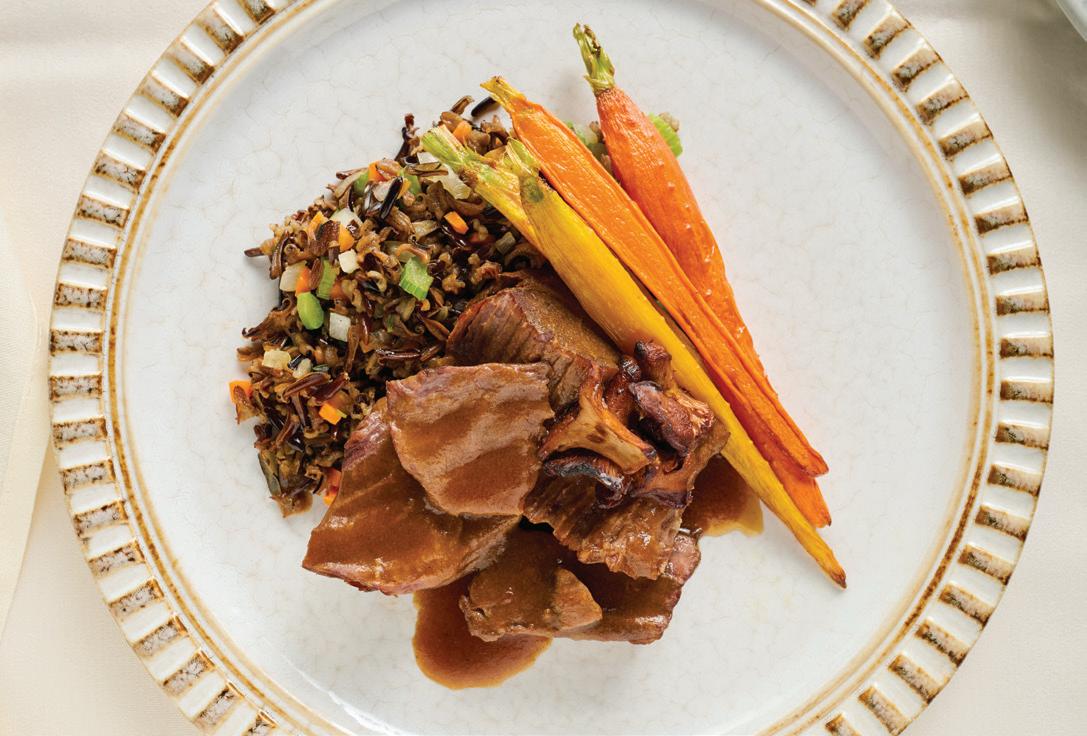

Fireside Chats
November marks Native American Heritage Month. We talked to the team at Potawatomi Casino Hotel about how they honor that history, find inspiration in it, educate others and more.
Milwaukee’s Menomonee Valley was home to the Potawatomi tribe centuries ago, long before European settlement. In the 1700s, the Valley was a thriving natural oasis. By the mid-20th century, it couldn’t have looked more different – home to heavy industry for decades after the Potawatomi were forced off the land, the Valley became desolate, full of toxic brownfields. That was until the Forest County Potawatomi regained some of their ancestral territory and began building what was then called Potawatomi Bingo. The casino opened its doors on March 7, 1991.
Brooks Boyd (left), chairman of the Forest County Potawatomi, and Pete Zach, director of culinary operations at Potawatomi Casino Hotel
Today, Potawatomi Casino Hotel is a landmark in Milwaukee, with thousands of employees, three major expansions and millions of guests every year. Potawatomi’s ties to its history remain strong, and it continues to bring vibrant Native American culture to Milwaukee.
“The Menomonee Valley, where Potawatomi Casino Hotel now stands, is more than just land to us – it is part of our story,” says Brooks Boyd, the Forest County Potawatomi chairman. “For generations, the marshes, rivers and wetlands here sustained our people. For many years, this land passed through other hands. But in 1990, our tribe began reclaiming pieces of the Valley. When we built Potawatomi Casino Hotel, it was about more than creating economic opportunity – it was about coming home. For us, this place represents a return to our ancestral homelands and a promise to remain part of the Valley’s future. It is a way to honor those who came before us while bringing prosperity to the Forest County Potawatomi today.”
During Native American Heritage Month, Potawatomi Casino Hotel hosts multiple events honoring the tribe’s heritage. “We prioritize collaboration with community partners to share and celebrate our culture both on and off property,” says Boyd. “From lighting the Hoan Bridge for Indigenous Peoples’ Day and our Hunting Moon Powwow, to partnering with the Milwaukee Public Museum and Milwaukee Art Museum during Native American Heritage Month, we work to make Native culture accessible and engaging for all.”
That extends to the casino hotel’s dining.
“In November, we partner with a Native American chef to create a five- or six-course dinner. They come in for a couple of days and work with our team. It’s an amazing experience to see the different chefs and how they work,” says Pete Zach, director of culinary operations.
Potawatomi cultivates recipes and dishes that showcase the Native American culinary legacy, with ingredients like wild rice, corn and baked squash. The culinary team also works with Native American vendors, such as Red Cliff Fish Co., an Indigenous-owned fishmonger in Bayfield that provides fish caught in Lake Superior. “Our culinary team takes pride in working with local vendors, caring for the land through sustainable practices, and sharing Native flavors on our menus,” says Boyd. “One of the most important ingredients you’ll see is wild rice. It has a deep connection to this region. In fact, the name Menomonee comes from the Anishinaabe language: meno means good and min means grain or fruit. The Valley’s wetlands were once full of wild rice – menomin – a sacred and nourishing food that has fed our community for generations.” ◆
THE DISHES

Braised Bison Plate
AVAILABLE AT: MARKETPLACE – TACO SPOT
Braised bison, wild rice pilaf with wild mushroom and cranberries, maple herb roasted vegetables.

Fry Bread Bread Pudding
AVAILABLE AT: MARKETPLACE – MINI & WOW
A bread pudding made with fry bread, with wojape berry sauce.
Bison Chili
AVAILABLE AT: SPORTSBOOK
Chili made with bison meat, with cheddar jack cheese, green onions.

